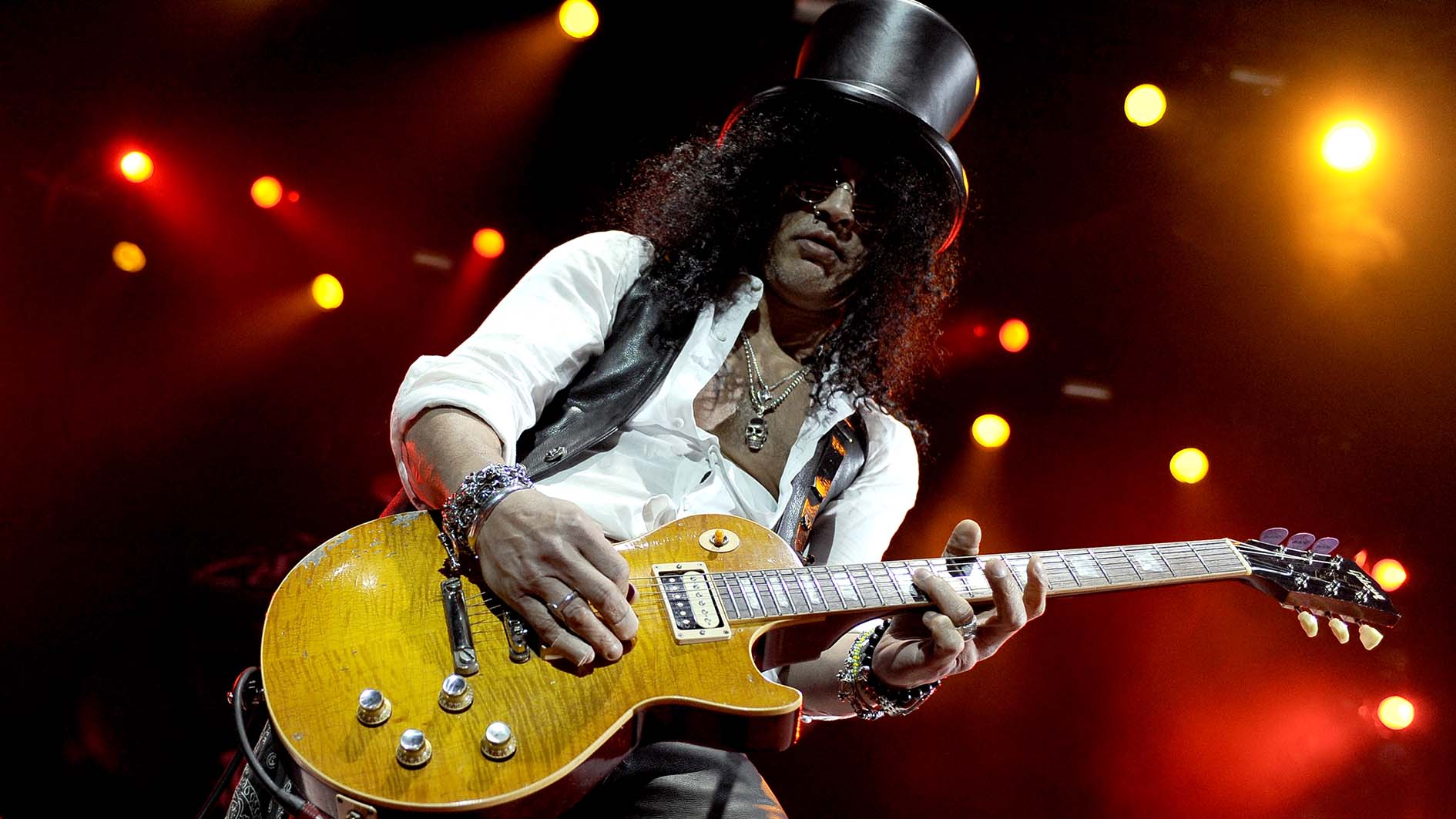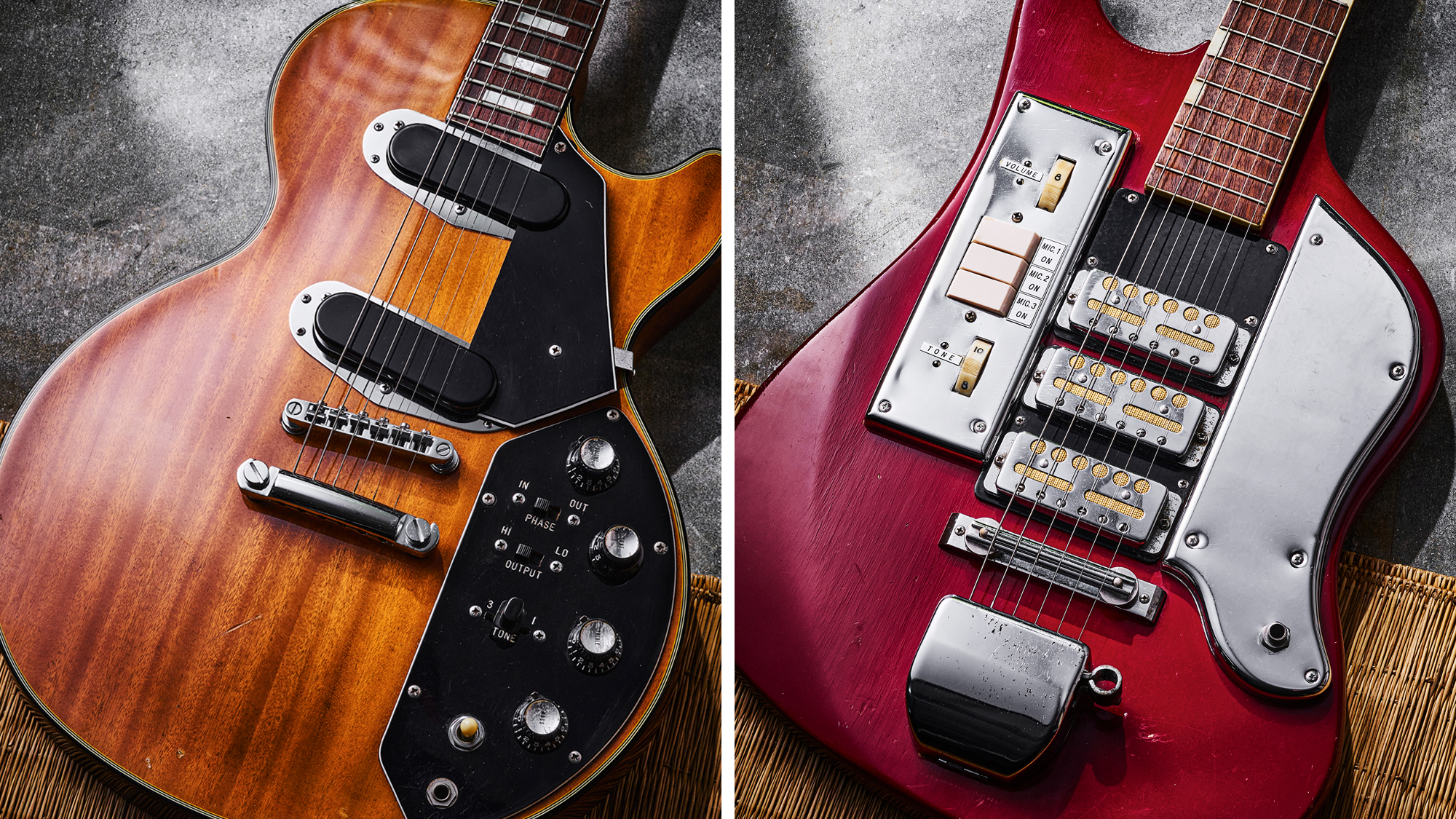Slash's best guitar solos ranked
The top-hatted one's greatest leads from Guns N' Roses to Velvet Revolver and beyond

Guitar players really don’t come any more iconic than Slash. Even his silhouette, with that trademark top hat and Gibson Les Paul slung low, is enough for any music fan to discern exactly who they're seeing within a flash of a second.
But it doesn’t end there. The London-born guitarist’s leads are every bit as unmistakable, and no matter what band he’s played in over the years, from Guns N’ Roses, Slash’s Snakepit, Velvet Revolver to his more recent solo group – or, indeed, the artists he’s collaborated with, including Michael Jackson, Lenny Kravitz and Alice Cooper – he’s one of the most instantly recognizable talents ever to have picked up the instrument.
Naturally, his career has been littered with moments of six-string brilliance, thanks to that bluesy vocabulary and the impeccably voiced overdriven tones which allow him to sing, more often than scream, through his instrument.
It’s that sense of playing the right part for the song – instead of trying to sweep, tap and shred like many other '80s rock players – that has given his ideas an abundance of soul and identity, ultimately turning him into one of the most universally admired guitarists on the planet.
Here, we chart 10 of Slash’s best solos to appear across his incredibly prolific career to date…
10. Slash – Beautiful Dangerous feat. Fergie
Album: Slash (2010)
Slash’s 2010 solo debut was a star-studded affair, to say the least, with rock and roll royalty such as Ozzy Osbourne, Chris Cornell, Lemmy, Dave Grohl and Iggy Pop being only too happy to sign up to participate.
Get The Pick Newsletter
All the latest guitar news, interviews, lessons, reviews, deals and more, direct to your inbox!
That said, it was this collaboration with Black Eyed Peas singer Fergie that quickly became one of its more unexpected highlights – in many ways very reminiscent of Appetite For Destruction closer Rocket Queen.
The solo is a masterclass in F# pentatonics, starting with a bend that’s held and released several times to really catch the listener’s attention before soaring into the stratosphere.
9. Velvet Revolver – Fall To Pieces
Album: Contraband (Velvet Revolver, 2004)
Most guitarists would be lucky to have played on just one truly great debut album. Slash has played on several – one of which being Velvet Revolver’s 2004 debut, which saw him, Duff McKagan and Matt Sorum pairing up with Stone Temple Pilots frontman Scott Weiland and rhythm guitarist Dave Kushner.
While its other big single, Slither, witnessed Slash delivering more up-tempo lead work, Fall To Pieces was the sound of him dialing things back and letting just a few choice bends say more with less. It’s also a solo where he effortlessly switches between minor and major pentatonic shapes, much like the original blues greats who inspired him.
8. Slash's Snakepit – Serial Killer
Album: Ain't Life Grand (Slash's Snakepit, 2000)
Though it’s arguably one of the lesser-known tracks by Slash’s Snakepit, let alone by Slash in general, there’s some real magic to what he chose to play for the solo on Ain’t Life Grand’s seventh track.
Much like Monkey Chow, his phrasing feels more arpeggio-based than what he’d typically been known for, and even incorporates the kind of diminished runs normally associated with the likes of Yngwie Malmsteen, though at less frenetic speeds.
But what makes it even more impressive is how he brings it back to the pentatonic framework that’s always been a big part of his musical DNA. Bravo!
7. Slash's Snakepit – Monkey Chow
Album: It's Five O'Clock Somewhere (Slash's Snakepit, 1995)
Given the commercial success of Guns N’ Roses and – to a lesser extent – Velvet Revolver, it would be fair to say the two Slash’s Snakepit studio albums could be regarded as the unsung heroes in the guitar legend’s back catalogue.
This sixth track from their 1995 debut, which also featured Guns N’ Roses mkII bandmates Matt Sorum, Gilby Clarke and Dizzy Reed – as well as Alice In Chains bassist Mike Inez and Jellyfish guitarist Eric Dover on vocals – opens with an ear-catching motif that descends using double-picked notes.
Slash then plays a variation of that motif up the neck an octave higher before introducing some pentatonic ideas and even some tasteful sweep picking – which, all things considered, is a technique the guitarist has very rarely employed over the years.
6. Michael Jackson – Give In To Me
Album: Dangerous (Michael Jackson, 1991)
The seventh of the nine singles found on Michael Jackson’s eighth studio album could be the closest the King of Pop ever came to sounding like Guns N’ Roses, thanks to some stunning fretwork courtesy of Mr Saul Hudson.
The two solos are mainly an E minor pentatonic affair, with the occasional flat five adding some bluesy spice as well as some minor sixths for an Aeolian feel. “He was so amazingly musically fluid,” Slash recalled in 2018.
“Such a treat to be around… I did a couple of shows with Michael in Tokyo and saw how this whole massive fucking thing worked, and he was the center of it. The only time I really felt like he was in any kind of comfort zone was when he was actually onstage.”
5. Guns N' Roses – Estranged
Album: Use Your Illusion II (Guns N' Roses, 1991)
Much like Use Your Illusion I’s standout ballad November Rain, Estranged is a sprawling track with several guitar solos that contribute greatly to its overall ebb and flow. The final lead break arrives after some whale noises (in his own words made by using “a little delay, my volume knob and bending a string downwards”) and begins with a screaming double stop on the two higher strings.
It’s a great example of how Slash’s preference for medium-output Alnico II pickups, made by Seymour Duncan, allowed for more of an organic tone – anything hotter wouldn’t have had quite the same clarity.
4. Guns N' Roses – Double Talkin’ Jive
Album: Use Your Illusion I (Guns N' Roses, 1991)
Anyone that’s caught Guns N’ Roses on their recent Not In This Lifetime reunion tour – or, indeed, the original Use Your Illusion run from 1991 to 1993 – will have seen Slash extending his leads for a song that’s already two-thirds guitar solo.
For this track, he decided to go with an enchanting and dramatic Phrygian feel, and this is made evident from the very beginning – starting on the minor second and soon resolving one fret down, capitalizing on the power chord progression that goes from E to Eb.
“I’m not thinking in technical terms because I don’t really know that stuff specifically – I just know the note is a half-step away from where it would normally be,” he told this GW writer when asked about the track in 2018.
“I don’t want to just play scales or some cool arpeggiated technique – the most important thing for me is focusing on the feel or mood of what I’m trying to achieve in those little combinations of phrasing.”
On the recorded version, the flamenco feel is re-emphasized by the band fading out against his nylon acoustics – which, for many guitar players and fans, sits high among the album’s many highlights.
3. Guns N' Roses – November Rain
Album: Use Your Illusion I (Guns N' Roses, 1991)
All of the lead sections from Use Your Illusion I’s final and biggest single are indicative of a master at work. Where most players would have been wondering how to cram in as many notes as humanly possible, Slash embraces his more minimalist side – milking each and every note with slow bends and expressive vibrato.
For the final solo, he introduces some faster runs which add to song’s brooding suspense, but it all still very much falls on the melodic side of rock playing. Wonderfully emotive with some truly mouth-watering and exquisite choice notes, it’s yet another example of how slow and steady can win the race.
2. Guns N' Roses – Sweet Child O’ Mine
Album: Appetite For Destruction (Guns N' Roses, 1987)
The main solo in Sweet Child O’ Mine is very much a game of two halves. Its opening segment, played on the neck pickup for a warmer and darker tone, is more melodic and modal, built around the Eb minor scale with a few major 7ths thrown in for a harmonic minor flavor.
Halfway in, Slash engages his Cry Baby wah and switches to the bridge pickup for more snarl as the band kick up a gear. It was, in many ways, the song that launched their career – the debut album having gone largely unnoticed until the release of this third single a whole year later.
And Slash’s solo played a big part in the song’s enduring popularity, demonstrating just how powerful and dynamic guitar leads could be, even in the context of pop-rock.
1. Guns N' Roses – Paradise City
Album: Appetite For Destruction (Guns N' Roses, 1987)
The fourth single from Guns N’ Roses' game-changing debut presented Slash at his most thrilling, and features some of the album’s most technically challenging leads in terms of sheer speed.
The outro solo, which is played as the band go into double time, is mainly a legato-based affair – with rapid-fire pull-offs and hammer-ons that require a fair amount of fretting hand strength around the six-minute mark.
It’s mainly built around the F# pentatonic scale, though played in G positions with the band tuned half-a-step down, while also incorporating some major sixths for a Dorian flavor and flat fives to add to its overall bluesiness.
In short, it's an absolute tour-de-force of rock-guitar soloing.
Amit has been writing for titles like Total Guitar, MusicRadar and Guitar World for over a decade and counts Richie Kotzen, Guthrie Govan and Jeff Beck among his primary influences as a guitar player. He's worked for magazines like Kerrang!, Metal Hammer, Classic Rock, Prog, Record Collector, Planet Rock, Rhythm and Bass Player, as well as newspapers like Metro and The Independent, interviewing everyone from Ozzy Osbourne and Lemmy to Slash and Jimmy Page, and once even traded solos with a member of Slayer on a track released internationally. As a session guitarist, he's played alongside members of Judas Priest and Uriah Heep in London ensemble Metalworks, as well as handled lead guitars for legends like Glen Matlock (Sex Pistols, The Faces) and Stu Hamm (Steve Vai, Joe Satriani, G3).
“I wanted to play more, and it was inappropriate with Eric or Roger. I was not the lead guitarist, and I wanted to be”: Clapton, Waters, Satriani and me – Andy Fairweather Low on his greatest collaborations and finally taking center stage
Celebrated jazz guitarist George Freeman, best known for his work with Charlie Parker and Gene Ammons, has died aged 97










